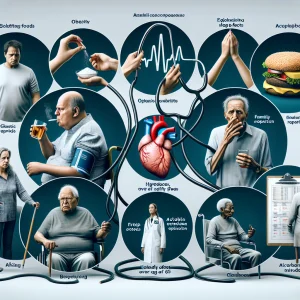Understanding High Blood Pressure: The Silent Threat to Your Health
High blood pressure, often known as hypertension, is a widespread health condition that affects millions of adults across the globe. Many people can live for years without realizing they have high blood pressure, as its symptoms frequently go undetected. This lack of awareness is alarming because untreated hypertension can lead to severe health problems, including heart disease, stroke, and kidney damage. Therefore, it is essential to undergo regular blood pressure screenings to monitor your levels and ensure they remain within a healthy range, safeguarding your long-term health.
Making minor yet impactful lifestyle changes can significantly enhance your ability to manage blood pressure effectively. Simple adjustments, such as incorporating a nutritious diet filled with diverse fruits, vegetables, and whole grains, can profoundly affect your blood pressure levels. Prioritizing quality sleep and engaging in stress-reducing activities like meditation or yoga can also contribute positively. These lifestyle modifications not only assist in maintaining healthy blood pressure but also promote overall well-being, ensuring that you lead a more energetic and healthier life.
 Comprehensive Guide to Blood Pressure: Importance and Measurement Techniques
Comprehensive Guide to Blood Pressure: Importance and Measurement Techniques
Blood pressure refers to the force that circulating blood exerts against the walls of blood vessels, primarily influenced by the heart’s pumping action. It serves as a critical indicator of how effectively blood circulates throughout your body and the resistance it faces as it flows through the arteries. Maintaining optimal blood pressure levels is vital for overall health, as abnormal readings can result in dire consequences, including organ damage and increased risk of heart-related diseases.
The measurement of blood pressure is expressed in millimeters of mercury (mmHg) and comprises two essential figures:
- Systolic Pressure – This is the first and higher number, reflecting the pressure in your arteries when your heart beats and pumps blood.
- Diastolic Pressure – This is the second and lower number, indicating the pressure in your arteries when your heart is at rest between beats.
For example, a blood pressure reading of 120/80 mmHg indicates a systolic measurement of 120 and a diastolic measurement of 80, which is generally recognized as a normal and healthy blood pressure level.
Understanding the Causes and Risks Associated with High Blood Pressure
High blood pressure can develop due to various factors, primarily linked to narrowed arteries that increase resistance to blood flow. This increased resistance can elevate blood pressure levels, putting immense strain on vital organs, including the heart, kidneys, brain, and eyes. Over time, uncontrolled hypertension can lead to severe complications, particularly cardiovascular diseases, which can significantly impact your quality of life and longevity.
While blood pressure can fluctuate for various reasons, healthcare professionals categorize readings based on established guidelines:
Low blood pressure – 90/60 mmHg or below
Normal blood pressure – Ranges from 90/60 mmHg to 120/80 mmHg
High blood pressure – 140/90 mmHg or higher
A reading between 120/80 mmHg and 140/90 mmHg may indicate a risk of developing hypertension in the future. However, it’s important to note that individual blood pressure norms can vary, so consulting with your healthcare provider is essential for understanding your specific health status and limits.
 Identifying the Multiple Causes of High Blood Pressure
Identifying the Multiple Causes of High Blood Pressure
Although there is no single cause of high blood pressure, several risk factors can contribute to its development. The most significant contributors include:
- Being overweight or obese
- Smoking
- Consuming a high-salt diet
- A family history of hypertension
- Excessive alcohol consumption
- Lack of sleep
- Inadequate physical activity
- Aging, particularly for those over 65
- Being of Caribbean or African descent
Many of these risk factors can be modified through proactive lifestyle changes. In rare cases, high blood pressure may be linked to underlying medical conditions or specific medications, affecting approximately 1 in 20 individuals. These conditions can include:
- Thyroid disorders
- Kidney diseases
- Diabetes
- Use of steroids
- Hormonal contraceptives
- Recreational drugs, such as cocaine
Unveiling the Hidden Symptoms of High Blood Pressure
One of the significant challenges associated with hypertension is that it often shows no noticeable symptoms, which can lead many individuals to remain unaware of their condition. In the UK, it’s estimated that around 25% of adults are living with undiagnosed high blood pressure. The most reliable method for determining your blood pressure status is through consistent testing.
You can have your blood pressure measured in various settings, including:
- Your GP’s office or with a healthcare professional – simply request a blood pressure check.
- Many local pharmacies that offer health services.
- Some workplaces that provide health screenings for employees.
- At home, using a personal blood pressure monitor to track your levels regularly.
 Proven Strategies for Effectively Lowering Your Blood Pressure
Proven Strategies for Effectively Lowering Your Blood Pressure
Recognizing that lifestyle factors significantly influence high blood pressure, implementing thoughtful changes can help mitigate your risk. Here are four essential strategies you can adopt to maintain healthy blood pressure levels:
Commit to Regular Physical Activity
Integrating regular exercise into your daily routine is vital for sustaining the health of your heart and blood vessels, ultimately aiding in the reduction of blood pressure levels. Carrying excess weight can impose additional strain on your heart, forcing it to work harder to circulate blood. By participating in physical activities, you can lose weight, improve your cardiovascular fitness, and enhance overall well-being, all of which contribute to lowering blood pressure effectively.
Embrace a Heart-Healthy Diet
Focusing on a balanced diet that prioritizes whole foods, including an abundance of fruits, vegetables, and lean proteins, can significantly aid in lowering blood pressure. Since high sodium intake is known to elevate blood pressure, reducing salt consumption is crucial. The NHS recommends limiting salt intake to less than 6g per day, roughly equivalent to one teaspoon. Consider minimizing processed foods high in salt and using herbs and spices to add flavor to your meals instead.
Moderate Alcohol Consumption
Reducing both the amount and frequency of your alcohol intake can play a crucial role in managing your blood pressure levels. Incorporating alcohol-free days into your routine and spacing out drinking days throughout the week can be beneficial. While the NHS suggests a maximum of 14 units of alcohol per week—which is about 7 pints of 4% ABV beer or 7 glasses of 175ml wine—it’s important to remember that you don’t have to consistently reach this limit.
Prioritize Adequate Sleep
Consistently poor sleep can increase the risk of developing high blood pressure. The NHS recommends aiming for 6 to 9 hours of quality sleep each night to support your overall health and maintain appropriate blood pressure levels. Establishing a calming bedtime routine, along with creating a sleep-effective environment, can greatly improve your sleep quality and contribute to better health outcomes.
Presented By: Private Blood Pressure Tests
The Article Blood Pressure Test Explained: What You Need to Know Was Found On https://limitsofstrategy.com


3 Responses
I found your insights on high blood pressure to be incredibly enlightening and all too relevant, especially as it feels like hypertension is often overshadowed by other health topics in our discussions. It’s staggering how many people are unaware that they are living with this “silent threat.” I can personally relate to the importance of regular screenings—I remember my own journey starting a few years back when a routine check revealed that my blood pressure was nudging towards the higher end of the spectrum. It was a wake-up call that compelled me to rethink my lifestyle choices.
This post really resonates with me, as I’ve personally seen the impact of hypertension in my family. It’s surprising how many people overlook their blood pressure until it becomes a serious issue. Regular check-ups have always seemed tedious, but I’ve learned it’s a small price to pay for safeguarding health.
I can relate to what you’re saying. It’s interesting how often people only really think about their blood pressure when something goes wrong. I’ve seen it in my own circle too—people who seemingly live healthy lifestyles, yet neglect to monitor their health metrics regularly.